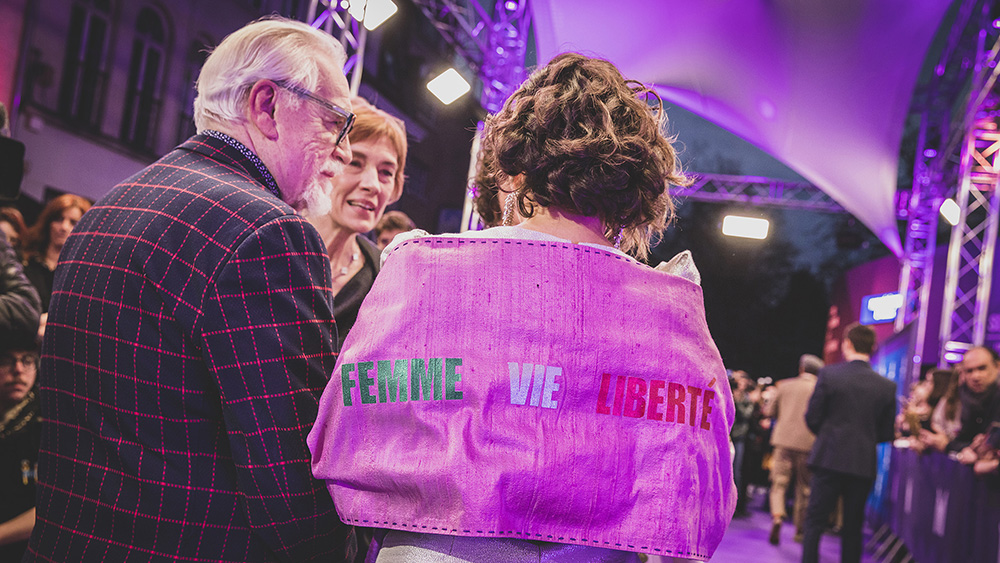French TV festival Series Mania started out playfully with a slew of humorous digs directed at its starry guests during the opening ceremony, including Brian Cox, back in town to hold a masterclass and introduce the latest episode of his smash hit “Succession.”
“I didn’t have time to watch Season 3. I have to see my children grow up, Brian!,” exclaimed host Daphné Bürki, before introducing this year’s opening show “Greek Salad” by Cédric Klapisch: “A prequel to ‘Norwegian Omelette,’ always starring Romain Duris,” Bürki joked.
Series Mania general director Laurence Herszberg joined in on the fun, giving a shoutout to “Emily in Paris’s” Philippine Leroy-Beaulieu, attending with co-star Arnaud Binard: “She became a symbol of a Parisian woman. I hope there isn’t too much weight on your shoulders, Philippine!”
Jumping from stage onto the screen, Herszberg also starred alongside artistic director Frédéric Lavigne in a video clip spoof of “The Crown,” which saw Hugo Bardin, known by his drag name Paloma, appointed as the Queen’s successor.
“We have been doing these films for three years now, but before, we would only parody French series. This is the first time we decided to take on a show that’s world-famous and we even found a place that looked just like [Buckingham Palace],” Lavigne told Variety after the ceremony.
He also noted that despite a lighter note, current protests in France against the government’s proposed pension reform plan are very much on people’s minds – as well as the ongoing war in Ukraine and the situation of women in Iran and Afghanistan, as pointed out by Herszberg. Nicole Ansari-Cox also took a stand on the festival’s violet carpet, presenting the slogan “Woman, Life, Freedom.”
Credit: Photographe Seriesmania
While jury president Lisa Joy – joined by Emmanuelle Béart, Anurag Kashyap, Chris Chibnall, Judah Levi and Lou Dillon – underlined the importance of “world-creation, whether it’s the world at large in a series or the emotional landscape of the characters,” as well as looking for things that resonate with people, Frédéric Lavigne opened up about multiple new trends, starting with stories set in the 1980 and 1990s.
“I am not exaggerating – at one point we counted and it was half of the shows we were receiving. We were getting fed up! It probably has to do with the fashion from that time bouncing back, and ‘Strange Things’ really launched the trend. Also, it was the childhood of many creators who are coming up now.”

Brian Cox
Credit: Photographe Seriesmania
But setting shows in the recent past also allows its creators to talk about present struggles, he said. From economical issues to terrorist threats and women’s rights.
“We have several shows about abortion, which was not allowed back then. The subject is coming back as some countries are trying to steal these rights once again.” Like in the Quebecois limited series “Disobey,” premiering in the International Panorama section, one of the many female-led stories this year.
“There are almost no male roles anymore! To sell a show, you need a female protagonist,” said Lavigne, also mentioning Greece’s “Milky Way,” “Funny Woman,” Helena Bonham Carter starrer “Nolly” and Germany’s “A Thin Line.”
“There are two twin sisters hacking companies that don’t care about climate change. A few years ago, we would have had two brothers instead. It’s a strong tendency, but we probably have to balance it a little bit more [in the future].”
Lavigne also commented on shows getting shorter and shorter these days – a big change from the days of “Mad Men,” allowed to simmer for a whooping seven seasons.
“The number of episodes is shrinking as well. It’s just cheaper this way: With recurring shows, everyone keeps asking for more money or starts competing. Also, platforms need fresh content every week. They love to announce new projects with new talent: ‘We have Tom Cruise!’ But they know they won’t have Tom Cruise four years in a row, so it’s better to have one miniseries with Nicole Kidman.”
Not shying away from big names either, with “Desperate Housewives’” Marcia Cross arriving in Lille later this week, the festival tries to do “everything, everywhere, all at once,” observed Lavigne. Just like a certain Oscar winner.

Credit: Photographe Seriesmania
“We can show small arthouse shows and big titles, but we are convinced that our role is to find stuff that nobody expects or wouldn’t be able to see otherwise,” he noted, mentioning new shows from Iran (“The Actor”) and Pakistan-India (“Limboland”).
“Now, shows are worldwide and I would say that local platforms are even more daring. Also, nobody thinks that you shouldn’t make a series before your first feature, for example, citing ‘Milky Way,’ director Vasilis Kekatos, who won in Cannes for his short.”
Still, there is no denying a mainstream hit like “Emily in Paris” either.
“From a realistic point of view, for French people this show makes no sense. The Parisians go: ‘What? That’s not my city.’ But in a way, [Jean-Pierre Jeunet’s] ‘Amélie’ was the same. It’s a love-hate relationship: We love hating the show and we love that it makes France look good. I live near this square from the show and I often see American tourists there, taking pictures. Of course, it has nothing to do with our daily life – especially now, with the garbage crisis caused by the strike. Everyone says that next season will be called ‘Garbage in Paris.’”


